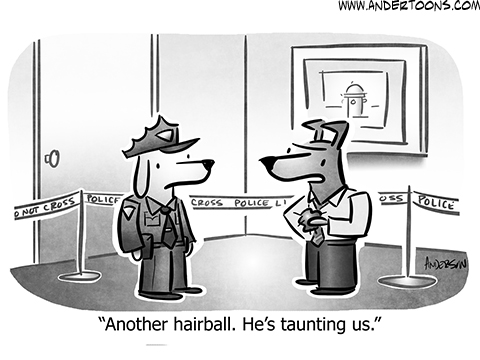Do you own a cat? If so, hairballs are a part of life for you and your feline friend. They’re certainly not pleasant to look at, and it doesn’t seem very pleasant for Fluffy when she coughs one up, but are they dangerous? Learn more here from a Roanoke, VA vet.
Why Do Hairballs Occur?
Your cat grooms herself often, as you know. When she does, tiny barbs lining the tongue pick up much of the loose hair from your cat’s coat. She swallows that hair, and most of it gets moved through the digestive tract normally and is ultimately expelled in the feces. Some of the swallowed hair, however, remains in the gut, clumping together over time to form a hairball. That gets regurgitated eventually, likely accompanied by a small bit of stomach fluid.
Do Hairballs Hurt My Cat in Any Way?
No, the occasional hairball doesn’t hurt your cat. It’s a natural part of life! There’s absolutely nothing to worry about if you see your cat cough up a hairball every now and then.
If your cat coughs up hairballs frequently, something could be causing her to shed more than normal. You’ll want to have your pet checked out at the vet’s office to be safe. Additionally, if your cat is gagging and retching but not producing anything, rush her to the vet’s office—your pet could be choking, or the hairball itself could be lodged in the esophageal tract.
Last but not least: vomiting and coughing up hairballs is not the same thing. If your cat is vomiting frequently, it’s time to see the vet.
How Can I Help My Cat Experience Fewer Hairballs?
You’ll be happy to learn that there are a few simple steps you can take to have your cat cough up fewer hairballs. That’s more pleasant for her, and it leaves less of a mess for you! First, brush your cat regularly; this removes a lot of the loose hair from Fluffy’s coat, preventing her from swallowing it in the first place. Secondly, make sure that your cat is receiving a high quality diet that contains all of the proper nutrients. When your cat’s nutrition is in tip-top shape, her coat of fur stays healthy with minimal shedding.
Does your cat need a veterinary exam? Schedule your four-legged friend’s next appointment right here at your Roanoke, VA animal hospital. We’re here for you!




